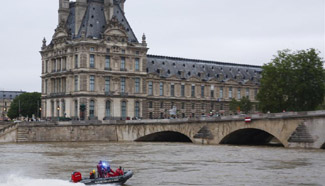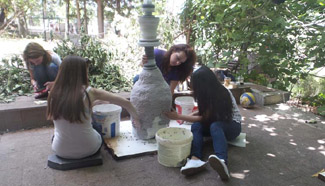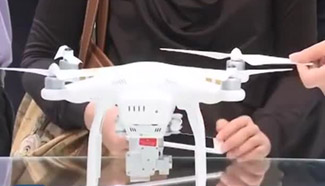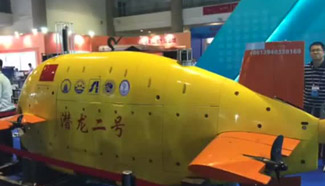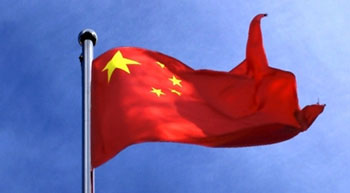ISTANBUL, June 4 (Xinhua) -- Turkey seems to be moving away from its hardline Syria policy in a bid to build up its team of allies against the increasing threat of a possible a Kurdish state along its border, analysts said.
Early last week, Turkey's new Prime Minister Binali Yildirim described the civil war in Syria as "meaningless."
Yildirim's remarks came as quite a surprise as Turkey is among the countries that have been offering all sorts of support to rebel groups in their fight against the Syrian government.
"The fact that the emergence of an autonomous PKK region (in Syria) is now increasingly possible has pushed Turkey into taking such a stance," observed Celalettin Yavuz, a security and foreign policy analyst who is a former staff officer in the Turkish military.
The PKK stands for the outlawed Kurdistan Workers' Party, which has been fighting against Turkey since 1984 for an autonomous if not an independent Kurdistan in Turkey's predominantly Kurdish southeast.
Kurdish forces in Syria are organized under the People's Protection Units (YPG), which is seen as the Syrian offshoot of the PKK.
The Turkish premier underlined that Ankara would now seek to increase the number of its friends while reduce that of its enemies in the region.
"This meaningless war in Syria... has cost the lives of hundreds of thousands of our coreligionists," he added.
It has been quite a while for the Turkish officials to demonize the Syrian government, and label Syrian President Bashar al-Assad as cruel murderer and terrorist.
Hasan Unal, the head of the department of international relations at Atilim University, feels that Yildirim's remarks about Syria boosts "optimism that there will come out a change in the government's policy."
"Because the current Turkish policy has faltered, to say the least," Unal said, noting that former Prime Minister Ahmet Davutoglu had usually been blamed, rightly or wrongly, for Turkey's foreign policy on Syria.
New steps need to be taken "seriously" regarding Russia, Syria, Israel and the European Union, said Numan Kurtulmus, the spokesman for the ruling Justice and Development Party, and deputy prime minister.
Kurtulmus, who indirectly admitted Turkey's incapability to impose how the conflict in Syria will be resolved, was quoted by the Hurriyet daily as saying on Wednesday, "In Syria, Turkey will back a process in which all segments of the people are included and could express themselves."
Yet not long ago, senior Turkish officials often vowed that al-Assad would have no place in the future of Syria.
After Russia got militarily involved in the civil war at the Syrian government's side in September last year and the United States dropped the idea of toppling al-Assad, it had become clear that Turkish efforts to oust the Syrian leader would only fail.
The YPG has established three autonomous cantons along the Turkish border since the civil war began in 2011. It also announced in mid-March the establishment of a de-facto federation composed of the cantons..
"Given the circumstances, Turkey has no other alternatives. It should mend ties with Syria and Russia," said Yavuz, who teaches international relations in Ankara's Ufuk University.
Ankara-Moscow ties have soured after Turkey shot down a Russian fighter jet in November last year, claiming the jet had violated the Turkish airspace.
The YPG currently controls more than two-thirds of Turkey's 911-km-long border with Syria.
The Syrian government, the United States and Turkey announced their refusal to recognize a federal system in the Kurdish-controlled area, but a leading Kurdish figure had warned that Kurds would seek independence if the demand for a federation is rejected.
Turkey should stop supporting Sunni groups against al-Assad if it is in favor of Syria's territorial integrity, Unal said, noting the current policy does not serve Turkey's best interests.
Nidal Kabalan, Syria's former ambassador to Turkey, recently told the BBC Turkish that Syria is ready to mend ties if Turkey would stop terrorists from entering Syria and cease helping rebel groups.
According to the BBC report on Wednesday, Kabalan also said that he would not be surprised if there had been indirect dialogue between Turkish and Syrian officials.
Kabalan is reportedly now the head of the Damascus-based think tank "Syrian Center of Strategic Turkish Studies."
A recent visit to Damascus by some leading officials of Turkey's Vatan Party seems to fit into Kabalan's perception about unofficial talks.
Beyazit Karatas, the deputy chairman of the party, implied at a press conference last Friday following the visit that the latest developments in Turkey had raised hopes of the Syrian government about possible improvement in ties with Turkey.
The Syrian government is ready to develop a joint combat strategy against terrorism with Turkey, should Ankara stop supporting rebel groups, said Karatas.
The Vatan Party delegation, which included three former generals in the Turkish military including Karatas himself, met with Syrian Deputy Foreign Minister Faisal Mekdad, several other cabinet ministers as well as high-level security officials during the visit.
Mekdad revealed at the meeting that Syrian and Turkish officials recently met in Geneva, according to Karatas.
The delegation was headed by Ismail Hakki Pekin, a former three-star general who headed the intelligence department of the Turkish General Staff.
Following the collapse of a de-facto cease-fire last July, the PKK resumed attacks on Turkish security forces particularly in the country's Kurdish southeast.
More than 500 members of the security forces have since lost their lives, while over 4,000 PKK militants were killed, according to official statements.
Turkey sees the YPG as a terrorist organization like the PKK. Washington, however, continues its military support to the YPG which it uses as ground forces against the Islamic State in Syria.
There have been indications in the past that a Kurdish state could get support from Israel, Saudi Arabia and some Western powers including the United States.
By mending ties with Syria, Turkey may also be hoping to get its neighbor's permission for a military intervention in case of YPG's attempt to unite the three cantons, some analysts said.
Related:
Spotlight: Turkish intervention into Syria risks larger confrontations: analysts
ISTANBUL, May 20 (Xinhua) -- A unilateral military intervention into Syria, as threatened by Turkish President Recep Tayyip Erdogan, may well put Turkey into head-on clashes with its rivals and drag it into the protracted civil war in its neighbor, analysts have warned. Full story
Turkish president threatens unilateral actions against IS group in Syria
ANKARA, May 12 (Xinhua) -- Turkey is prepared to take unilateral actions against the Islamic State (IS) in Syria to protect its southern border town Kilis from IS attacks, President Recep Tayyip Erdogan said on Thursday. Full story





